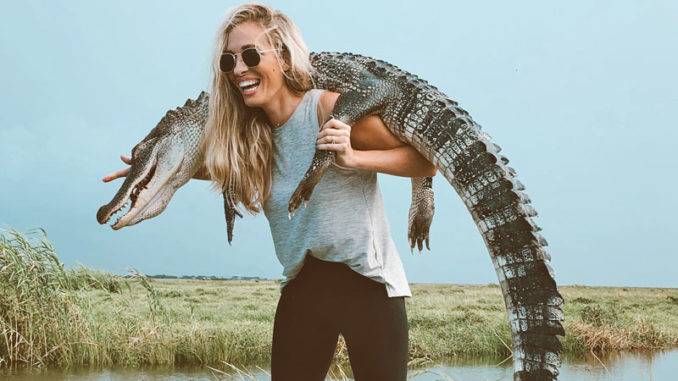
Will California’s ban on skins hurt commercial hunting, lead to more sport ‘gator hunting?
We were surprised when Sammy Romano of Shag’s Sporting Goods boarded the boat with a graphite, high energy compound bow to go and check alligator lines. Capt. Randall Shaw of Louisiana Fishing Charters brought us through Lake Leary to a recently dredged canal to check lines.
Shaw eventually found an angry alligator on-line, and Romano made quick work of it with a 465-grain arrow moving at 270 feet per second. This seemed like the beginning of a new hunting atmosphere that would introduce new and interesting ways to hunt and capture alligators for sport.
“They were commercially hunted; the pricing dropped, no money in them any more. The commercial fishermen kind of pulled out, and you’re seeing guides come in, and now it’s going to be sport-hunted just to keep up with the population,” Shaw said.
California law
The Louisiana Department of Wildlife and Fisheries’ decision to sell alligator hunting licenses recently gave individuals the ability to hunt alligators with guides who carry LDWF tags. This change is industry wide, with commercial alligator trapping and alligator farming being heavily affected due to a highly contested ban on alligator skins set to go into effect in California on Jan. 1, 2020.
With this deadline on the horizon and many companies ending their participation in the sale of animal products, buyers in Europe and in other parts of the world have been cancelling orders for tanned alligator hides and looking for alternatives to alligator and crocodile, according to alligator farmer Jerry Savoie of Cutoff.
“The price is suppressed because there’s no market. The people in Europe are nervous; they’ve been cancelling orders. They don’t know where the future is; they don’t know what’s going to happen,” Savoie said.
The drop in demand could cause major effects on the ability of commercial alligator hunters and trappers to turn a profit. This means that not as many alligators will be taken, which may cause the population to skyrocket even further, according to Savoie.
History repeating?
Shaw said this is where sport hunting will come in to control the species’ population. He said it’s just history repeating itself with a different species.
“The same thing that happened with redfish,” Shaw said. “Redfish was a commercially fished product, (then) they eliminated the gill nets. Next thing you know, the redfish prices went through the roof, so the farming market got involved in it, and when that happened, the commercial fishermen got out of redfishing.
“It opened up a market for guides. Guides went in, and they were able to get an average of $30 a redfish which was more than before, and it took the pressure off of the population.”
Shaw believes that the alligator becoming more of a game animal could be a good thing for south Louisiana. He believes there will probably be a massive expansion of alligator guides as more tags are given to guides as the number of commercial trappers decrease. The possible ways to hunt alligators are numerous and underexplored in Louisiana.
Shaw said that you might see the LDWF change their regulations if alligators get too overpopulated — making it easier to hunt.
“Any time a guide has gotten involved with something and made it a sport, it seems to always have been good for that species.” he said.